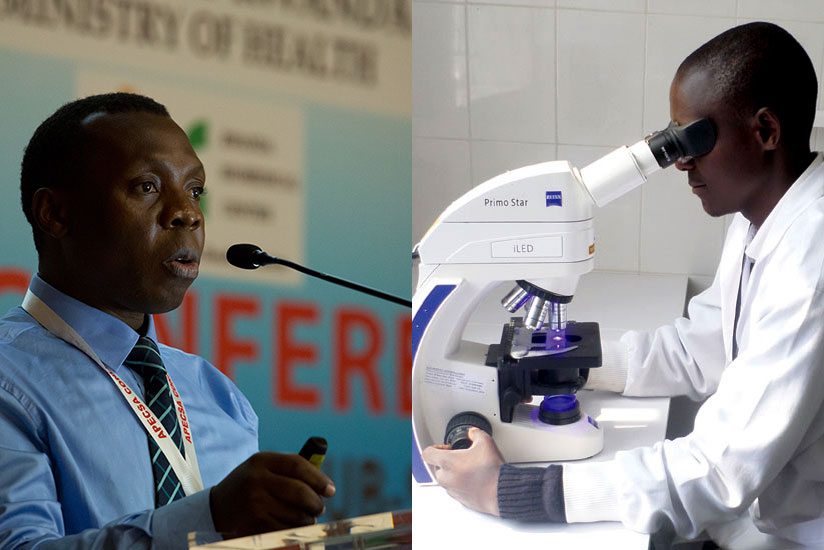Dr Robert Lukande, a Histopathologist and the president of the Association of Pathologists of East, Central and Southern Africa (APECSA), shared his thoughts with The New Times’ Athan Tashobya on why most African medical facilities do not use laboratories while treating patients.


In Sub-Saharan Africa, many cases of late medical diagnosis – resulting into life-threatening health complications – are due to poor medical laboratory examinations (pathology).
Last week, pathologists admitted that lack of accurate diagnosis could be one of the major causes of what would-be-avoidable mortality in Africa.
Dr Robert Lukande, a Histopathologist and the president of the Association of Pathologists of East, Central and Southern Africa (APECSA), shared his thoughts with The New Times’ Athan Tashobya on why most African medical facilities do not use laboratories while treating patients.
***
How would you describe the role of pathology in the entire medical chain?
Pathology is a branch of medicine that seeks to find the cause, origin and nature of disease. It deals with the laboratory examination of samples of tissue, organs, and body fluids in order to study and diagnose diseases. Therefore, pathology is central to the whole practice of medicine as it involves diagnosis and treatment. You cannot accurately and confidently treat a disease that you do not know. In summary, one can say medicine is pathology.
At which rate, would you define the involvement of pathologists in the treatment chain, especially in the sub-Saharan Africa?
Remember medicine is pathology and pathologists concern themselves with diagnosis and, therefore, help direct or guide treatment. Pathologists are the doctors that sit behind your own doctor to provide him or her with a diagnosis before you receive treatment. They are the consultants to doctors. The National Health Service (NHS) of the UK indicated that 70% of medical decisions in the UK depend on pathology.
Unfortunately, the figure for sub-Saharan Africa is not known. However, we can anticipate that it is lower than that of the UK because of the numerous challenges pathology faces in sub-Saharan Africa. These stem from low or lack of financing for pathology services to the low number of pathologists and laboratory scientists. The result is a lack of or poor laboratory infrastructure, low or lack of quality, and hence low access to the services.
How significant would it be if health facilities increased the involvement of pathologists in the region?
Ideally, every healthcare facility must have a laboratory to offer diagnostic services in order to direct treatment. It can be anticipated that the impact of increased involvement of pathologists is major and will significantly improve healthcare.
There are still few pathologists in the APECSA region. What is being done to encourage more medical students to take on pathology?
APECSA recognises the small numbers of pathologists and laboratory scientists in the region. A number of APECSA members are involved in medical education and training in the various medical schools and university teaching hospitals. This places them in the best position to attract and mentor medical students to pursue pathology as a career in medicine. This will help build up the number of pathologists. However, the numbers will not increase overnight but we have to start and continue on mentorship and leadership. Growing the career of pathology is one of the duties of APECSA members.
How would private public partnerships improve the quality of medical care in the region?
Partnerships between public and private sector players bring the strength of increased financing and resources, quality assurance and control systems accountable management and leadership. The successes that emerge from these partnerships will require the courage of each party to embrace the opportunities and fulfilment of their obligations.
Going forward, what are the future prospects of APECSA in resetting the pathology agenda and improving the health sector in the region?
APECSA, through its members, intends to continue calling for action in matters that pertain the provision of quality healthcare. The pathology agenda includes improved quality, increased access, mentorship and leadership and collaborations and partnerships. These will ensure the enjoyment of the highest standards of pathology and laboratory medicine by the population in the ECSA region. APECSA needs to push these agenda items to realise its influence.
Allow me to add that, governments of the member countries of APECSA need to realise the importance and position of pathology in healthcare. In addition, professional organisations like APECSA should be strongly supported in order to impact on the quality of healthcare.
editorial@newtimes.co.rw


